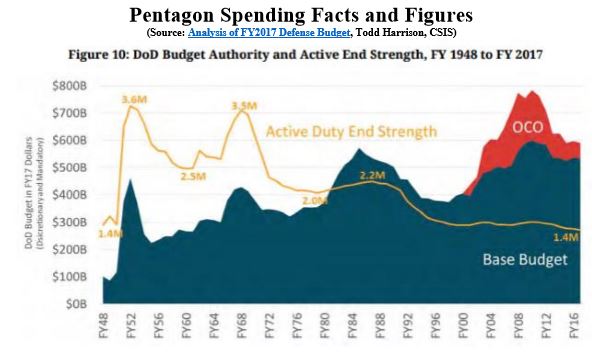
Head Smacker: Pentagon buried study showing $125 billion in waste, but Congress and the Trump Administration want to give it more money
According to the Washington Post, the Pentagon buried an internal study that found $125 billion in administrative waste because it was afraid Congress would use the findings to cut the defense budget. Despite this, the Trump Administration and some members of Congress are preparing to give even more money to the Pentagon for the current fiscal year and for years to come.
The Pentagon study concluded there was “a clear path to saving $125 billion in the next five years” that included reducing unnecessary staff through attrition, curtailing high-priced contractors and making better use of technology. It would not have required layoffs of civil servants or reductions in military personnel. The authors of the study recommended reallocating the money toward troops and weapons. Of course, we think that money could have been better spent on any number of human needs programs.
According to the Post, however,
“Some Pentagon leaders said they fretted that by spotlighting so much waste, the study would undermine their repeated public assertions that years of budget austerity had left the armed forces starved of funds. Instead of providing more money, they said, they worried Congress and the White House might decide to cut deeper. So the plan was killed. The Pentagon imposed secrecy restrictions on the data making up the study, which ensured no one could replicate the findings.”
The Pentagon has never undergone a formal audit, and unsustainable cost overruns of major weapons programs has been another ongoing problem, as Win Without War points out.
And now, the Trump Administration and defense hawks in Congress are insisting that the Pentagon needs more money. According to reports from CQ and others, the Department of Defense is preparing a budget amendment seeking additional funding to be submitted to the White House by March 1. The White House would then submit the request to Congress. The exact amount of money that will be requested isn’t known yet, but calls for anywhere from $18 billion to $40 billion have been heard around Capitol Hill. The Pentagon already received $8 billion in additional funding in the Continuing Resolution passed last fall that’s keeping the government funded for now, while most programs received flat funding.
Looking ahead, some Republicans in Congress, including Sen. John McCain, are calling for an FY18 base defense budget, excluding war costs, of $640 billion. That’s more than $91 billion above the amount permitted by current law. A white paper released by Sen. McCain (R-AZ) last month also calls for an additional $60 billion in FY18 for the uncapped Overseas Contingency Operations fund, a fund that is supposed to be used for overseas operations in Iraq, Syria and Afghanistan but has been routinely used by the Pentagon to increase its spending without technically violating the spending caps. In addition, Sen. McCain calls for “sustained growth for years thereafter” for the base defense budget. This “sustained growth” adds up: if McCain’s plan were to be implemented, the base defense budget would be more than by $720 billion by FY21 (the FY17 cap is $555.1 billion), and we would have spent more than $433 billion above what current law allows between now and then.
If the Pentagon does get more funding for the current fiscal year and beyond, we would hope Democrats in Congress will insist on maintaining the principle of “parity,” or providing equal relief from sequestration cuts for defense and non-defense programs. Will they succeed with this insistence? We don’t yet know. Rep Jim Jordan (R-OH), former chair of the ultra-conservative House Freedom Caucus, was recently quoted as saying, “We want to help defense more, so let’s break that firewall and let’s reduce spending in other places.” We have a feeling we know what some of those “other places” are.
One thing is for certain, though. At a time when some are saying the Trump Administration could call for budget cuts of close to $10.5 trillion over the next 10 years, including slashing critical human needs programs, it’s incredible to think of giving billions of dollars more to the Pentagon. Especially when it’s covering up billions of dollars in waste.
This post was originally published on the Coalition on Human Needs' blog, Voices for Human Needs. Receive similar articles in your inbox by subscribing today, and follow CHN on Facebook and Twitter.




The views and opinions expressed in this post are those of the author(s) and do not necessarily reflect those of MomsRising.org.
MomsRising.org strongly encourages our readers to post comments in response to blog posts. We value diversity of opinions and perspectives. Our goals for this space are to be educational, thought-provoking, and respectful. So we actively moderate comments and we reserve the right to edit or remove comments that undermine these goals. Thanks!